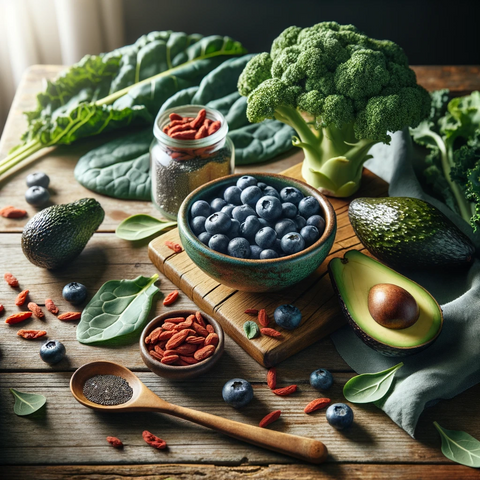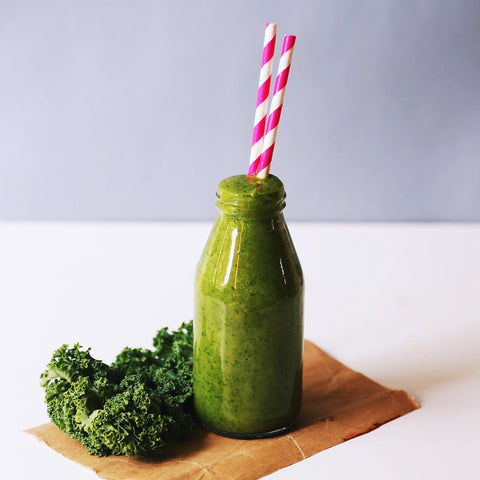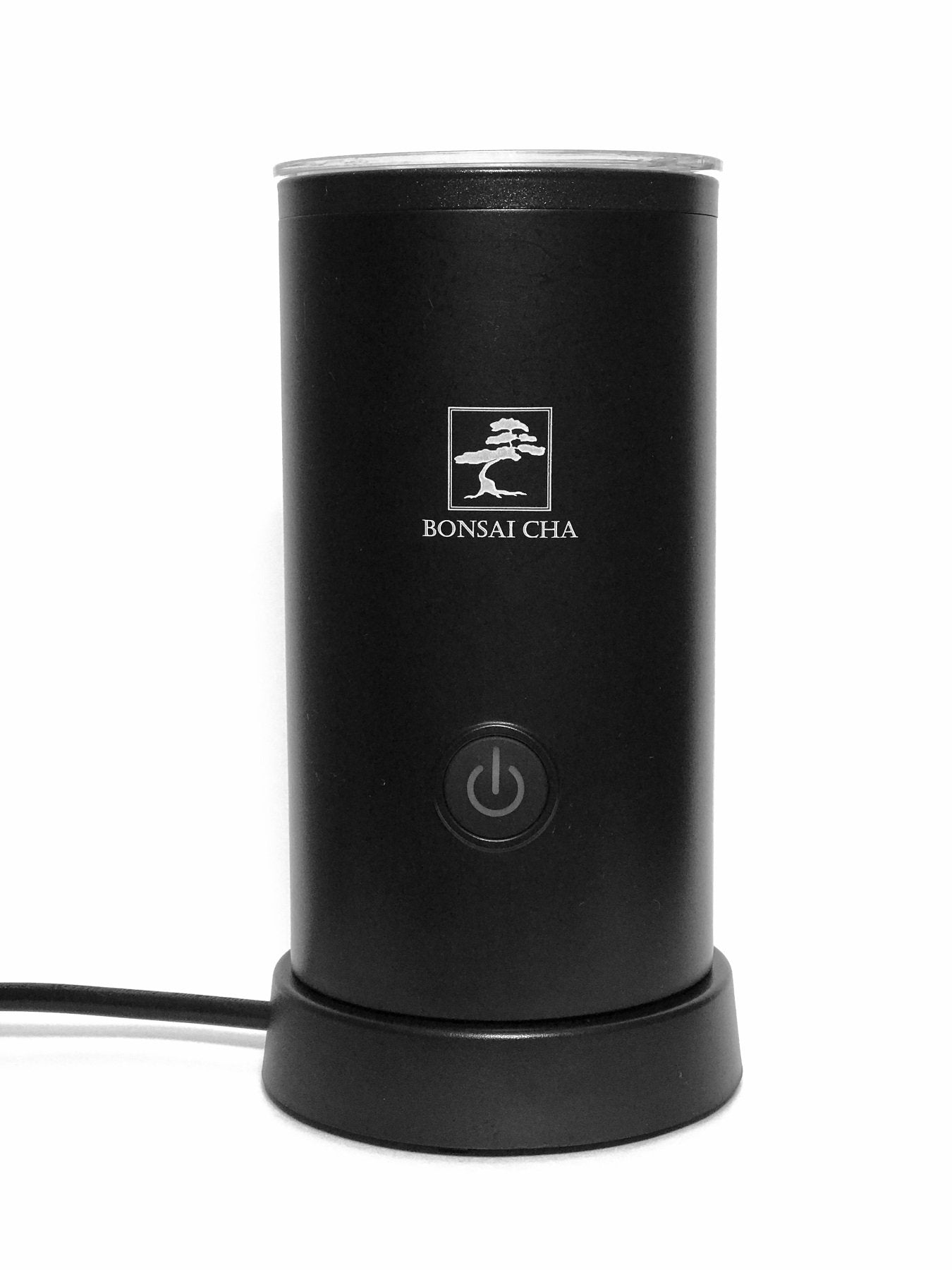
· By Avery Hastings
Superfoods: The Key to Optimal Digestion and Robust Gut Health
Superfoods for Optimal Digestion and Robust Gut Health
In today's fast-paced world, where quick meals and processed foods often take precedence over wholesome nutrition, the significance of superfoods has never been more vital. Superfoods, as their name suggests, are nutrient powerhouses that deliver a concentrated dose of vitamins, minerals, and antioxidants in every bite. But beyond their general health benefits, they hold a special place in the realm of digestive health.
The human digestive system, a marvel of nature, is responsible for breaking down the foods we eat, extracting nutrients, and discarding waste. However, the efficiency of this system doesn't solely depend on its anatomical functions. Instead, it's deeply influenced by the quality of our diet. This is where superfoods come into play, offering a harmonious blend of nutrients that not only nourish our body but also ensure the smooth functioning of our digestive processes.
Furthermore, nestled within the intricate pathways of our digestive tract is a bustling community known as the gut microbiome. This vast ecosystem, predominantly consisting of beneficial bacteria, plays a pivotal role in our overall well-being, influencing everything from digestion to mental health. The foods we consume directly impact the health and diversity of this microbiome, emphasizing the critical link between our diet and digestive health. (1)
As we delve deeper into the world of superfoods and their profound influence on digestion and the gut, we'll uncover the secrets of these nutritional gems and learn how they can be the cornerstone of a healthy, well-functioning digestive system. Whether you're a health enthusiast or someone just starting their wellness journey, this guide on superfoods will offer insights and recommendations to elevate your gut health to its peak.
The Synergy Between Superfoods and the Gut Microbiome
The Role of the Gut Microbiome in Digestion
The gut microbiome, a vibrant community of trillions of microorganisms, acts as the guardian of our digestive health. These microorganisms, which include bacteria, fungi, and viruses, collaborate in breaking down complex food particles, producing essential vitamins, and protecting against harmful pathogens. Their balanced existence is pivotal for optimal digestion, nutrient absorption, and overall gut health. (2)
Superfoods: The Champions of Microbial Diversity
Superfoods, with their rich nutrient profile, play a vital role in nourishing and diversifying the gut microbiome. They provide essential prebiotics - fibrous compounds that our body doesn't digest but serve as food for our beneficial gut bacteria. By feeding on these prebiotics, these bacteria flourish and maintain a balanced gut environment. (3)

Top Superfoods for Gut Health
Leafy Greens: Packed with vitamins and minerals, leafy greens like spinach and kale are powerful prebiotics. Their anti-inflammatory properties can also soothe digestive tract issues, making them a staple for anyone seeking optimal digestive health. (4)
Oats: A natural source of beta-glucan, oats promote the growth of beneficial intestinal bacteria. Whether you prefer classic oatmeal or trendy overnight oats, incorporating this superfood ensures a healthful dose of fiber that boosts your gut bacteria. (5)
Greek Yogurt: Beyond its rich calcium and vitamin D content, Greek yogurt teems with probiotics - live beneficial bacteria that replenish and balance the gut microbiome. Opting for plain variants without added sugars maximizes its benefits.(6)
Apples: Nature's sweet treat, apples are rich in a prebiotic fiber called pectin. This fiber is fermented by gut bacteria, producing fatty acids that nourish the gut lining and promote microbial diversity. (7)
Ginger: A potent digestive aid, ginger not only alleviates nausea but also fosters a balanced gut environment. Its anti-inflammatory properties further ensure smooth digestive processes. (8)
Matcha: This finely ground green tea powder is not just a trendy drink. Rich in antioxidants, matcha aids in reducing inflammation in the gut, promoting a balanced microbiome. It also contains a unique type of catechin that supports liver function and can help detoxify the body. (9)
Harnessing the Power of Additional Gut-Boosting Superfoods
While the aforementioned superfoods are foundational for gut health, the realm of digestion-enhancing foods extends even further. Diverse dietary choices not only ensure a spectrum of nutrients but also cater to the eclectic tastes of the myriad bacteria residing in our gut.
Superfoods for Gut Health
Asparagus: A springtime favorite, asparagus is rich in inulin, a type of prebiotic fiber. When consumed, it gets fermented by specific bacteria in the gut, promoting a balanced microbiome and aiding in regular digestion. (10)
Black Beans: These legumes are more than just a staple in Mexican cuisine. Black beans are packed with fiber, which not only ensures regular bowel movements but also serves as a feast for the beneficial bacteria in the gut. (11)
Leeks: These close relatives of onions and garlic are high in inulin and polyphenols. While inulin fosters a healthy gut environment, polyphenols combat oxidative stress, ensuring the gut lining remains intact and functional. (12)
Kombucha: This fermented tea beverage has gained popularity not just for its tangy taste but also for its gut health benefits. Rich in probiotics, kombucha introduces beneficial bacteria into the gut, enhancing microbial diversity and ensuring optimal digestion. (13)
Avocados: Beyond their Instagram fame, avocados are a powerhouse of nutrients. Rich in fiber and healthy fats, they not only promote satiety but also nourish the gut microbiome, ensuring a balanced and harmonious environment. (14)
Matcha: This finely ground green tea powder is more than just a trendy drink. Rich in antioxidants, matcha can reduce inflammation in the gut, support a balanced microbiome, and even assist in detoxifying the body. (15)

Incorporating Superfoods: Tips and Tricks
Smoothie Bowls: Blend your favorite superfoods like spinach, Greek yogurt, and matcha with fruits like bananas and berries. Top with oats, chia seeds, and a drizzle of honey for a gut-boosting breakfast.
Salads: Mix leafy greens with sliced avocados, apple chunks, and roasted asparagus. Add a ginger-infused dressing for an added digestive kick.
Soups: Create a hearty black bean soup and garnish with sautéed leeks. Serve with whole-grain bread for a fiber-rich meal.
Beverages: Sip on kombucha as a refreshing afternoon drink or incorporate it into mocktails. For a morning boost, try a matcha latte with almond or oat milk.
The Science Behind Superfoods and Our Gut
Our gut is a bustling metropolis of microorganisms, with each playing a pivotal role in our overall health. The foods we consume can either support or hinder this microbial ecosystem. Superfoods, rich in prebiotics and certain phytonutrients, serve as fuel for these beneficial microbes, ensuring they thrive and, in turn, benefit us.
The Interplay of Prebiotics and Probiotics
Prebiotics: These are the dietary fibers and compounds that our body cannot digest. However, they serve as food for the beneficial bacteria in our gut. Foods like asparagus, leeks, and oats are rich in prebiotics, feeding our gut's good bacteria. (16)
Probiotics: These are live beneficial bacteria introduced into our system through fermented foods like Greek yogurt, kefir, and kombucha. They directly add to the microbial diversity of our gut. (17)
Balancing the intake of both prebiotics and probiotics ensures a harmonious gut environment. While prebiotics ensure the resident bacteria are well-fed, probiotics introduce new beneficial strains, enhancing the gut's resilience and functionality. (18)
Modern Lifestyle and Gut Disruptions
Modern diets, rich in processed foods, sugars, and lacking in fiber, often disrupt the delicate balance of our gut microbiome. Stress, inadequate sleep, and certain medications can further exacerbate these imbalances. This makes the inclusion of superfoods in our diet even more crucial. They help counteract the adverse effects of modern lifestyles, ensuring our gut remains a stronghold of health.
Embracing Diversity for Gut Health
Incorporating a diverse range of superfoods ensures that different strains of beneficial bacteria in our gut receive their preferred nutrients. For instance, while some bacteria might thrive on the inulin from asparagus, others might prefer the pectin from apples. By diversifying our superfood intake, we cater to the eclectic tastes of our gut residents. (19)
Matcha: The Rising Star in Gut Health
Matcha, a finely ground green tea powder, has been a staple in Japanese culture for centuries. Rich in antioxidants, particularly catechins, matcha offers a plethora of health benefits. Recent studies indicate that matcha can positively influence the gut microbiota. The polyphenols in matcha are believed to increase the proportions of beneficial bacteria while reducing harmful ones. Incorporating matcha into smoothies, lattes, or even baked goods can be a delicious way to bolster gut health. (20)

Practical Integration of Superfoods into Daily Diets
Starting the Day Right: Breakfast is often dubbed the most important meal of the day. Kickstarting your morning with a bowl of oat porridge sprinkled with berries can set the tone for your digestive system. Top it with Greek yogurt for an added probiotic boost. If you're in a rush, overnight oats paired with apple slices or a matcha-infused smoothie can be a quick, gut-friendly option.
Midday Meals and Snacks: Lunches can be vibrant with leafy greens forming the base of salads, accompanied by sliced avocados, black beans, and roasted asparagus. Drizzle some olive oil and sprinkle some ginger for an extra layer of flavor and gut health benefits. For those midday hunger pangs, snacking on an apple with almond butter or sipping on kombucha can be both satisfying and beneficial for your gut.
Dinner Delights: Evening meals can be diverse. Incorporate whole grains like brown rice or whole wheat spaghetti. Pair them with lean proteins and season with anti-inflammatory foods like turmeric and ginger. Don't forget to add a side of steamed or sautéed leafy greens. Leeks can be a delightful addition to soups or stews, enhancing both flavor and nutritional value.
Desserts and Beverages: Contrary to popular belief, desserts and beverages can also be gut-friendly. Greek yogurt parfaits layered with fruits and nuts, or matcha-infused desserts, can be a sweet end to your meals. Beverages like ginger tea or warm water with a hint of lemon can aid digestion and soothe the stomach.
While superfoods provide numerous benefits, it's essential to recognize that everyone's gut is unique. What works wonders for one might not be as effective for another. Pay attention to how your body reacts to different foods. Experience bloating after consuming dairy? It might be worth exploring lactose-free alternatives.
The Journey to a Healthy Gut
A journey towards a healthier gut isn't a one-size-fits-all approach. It's a combination of knowledge, listening to your body, and making informed choices. With the array of superfoods available, tailored to cater to gut health, achieving a balanced and healthy digestive system is within reach. Remember, the key is consistency, diversity, and a genuine commitment to one's health.
Related Articles:
- Soothing Acid Reflux Naturally: Comparing Matcha to Other Natural Acid Reflux Remedies
- Matcha For Digestive Health: GERD, Acid Reflux and Gut Health
- Matcha for IBS: Symptom Management, Gut Health, and Beyond
- Discover the Soothing Benefits of Matcha for Bloating
- How the Nutritional Composition of Matcha Benefits Yout Gut
References
| 1 | David, L. A., et al. (2014). Diet rapidly and reproducibly alters the human gut microbiome. Nature, 505(7484), 559-563. |
| 2 | Thursby, E., & Juge, N. (2017). Introduction to the human gut microbiota. Biochemical Journal, 474(11), 1823-1836. |
| 3 | Role of Prebiotics and Diet in the Gut Microbiome. Gibson, G. R., et al. (2017). |
| 4 | Wang, J., et al. (2015). Modulation of gut microbiota during probiotic-mediated attenuation of metabolic syndrome in high fat diet-fed mice. The ISME journal, 9(1), 1-15. |
| 5 | Connolly, M. L., et al. (2010). Wholegrain oat-based cereals have prebiotic potential and low glycaemic index. British Journal of Nutrition, 104(12), 1808-1816. |
| 6 | Adolfsson, O., et al. (2004). Yogurt and gut function. The American journal of clinical nutrition, 80(2), 245-256. |
| 7 | Masumoto, S., et al. (2016). Non-absorbable apple procyanidins prevent obesity associated with gut microbial and metabolomic changes. Scientific reports, 6, 31208. |
| 8 | Rahmani, A. H., et al. (2014). Active ingredients of ginger as potential candidates in the prevention and treatment of diseases via modulation of biological activities. International journal of physiology, pathophysiology and pharmacology, 6(2), 125. |
| 9 | Roberfroid, M. B. (2007). Inulin-type fructans: functional food ingredients. The Journal of nutrition, 137(11), 2493S-2502S. |
| 10 | Guergoletto, K. B., et al. (2011). In vitro fermentation of cooked bean powders (Phaseolus vulgaris L.) by human gut microbiota. Food Research International, 44(7), 2480-2486. |
| 11 | Niness, K. R. (1999). Inulin and oligofructose: what are they?. The Journal of nutrition, 129(7), 1402S-1406s. |
| 12 | Villarreal-Soto, S. A., et al. (2018). Understanding kombucha tea fermentation: A review. Journal of food science, 83(3), 580-588. |
| 13 | Dreher, M. L., & Davenport, A. J. (2013). Hass avocado composition and potential health effects. Critical reviews in food science and nutrition, 53(7), 738-750. |
| 14 | Xu, P., et al. (2015). The effects of the aqueous extract and residue of Matcha on the antioxidant status and lipid and glucose levels in mice fed a high-fat diet. Food & function, 6(1), 294-302. |
| 15 | Unno, T., et al. (2019). Metabolic fate of catechins in rats after oral administration of matcha with some types of dietary fiber. Journal of Agricultural and Food Chemistry, 67(30), 8376-8384. |

